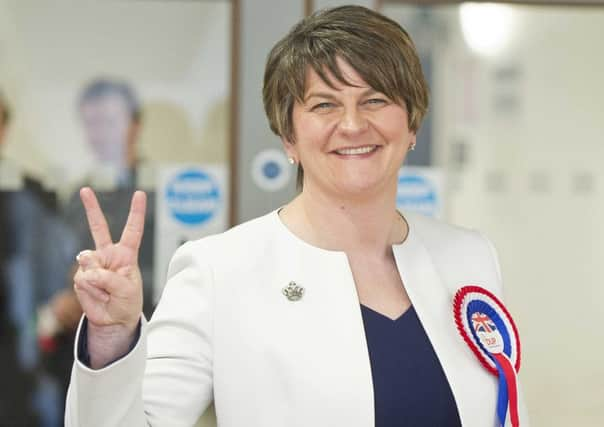It's Arlene's party now, as DUP secures stunning result


Confounding expectations that the party was sure to shed some seats after its 38-seat performance in 2011, the DUP last night appeared on course for at least that total.
Mrs Foster said that she believed the “confusion” from the UUP and SDLP as to whether they will be in Opposition had been one of the reasons that voters had opted for the DUP.
Advertisement
Hide AdAdvertisement
Hide AdWith counting to resume today in many seats, the three smaller Executive parties either stood still on their 2011 performance or went backwards.
Last night the Ulster Unionists looked likely to be left with just one MLA in the capital city, Belfast.
Jim Allister again failed in his quest to secure the election of a second MLA, leaving him as a lone TUV voice in the new Assembly.
All of the five Executive parties saw their votes fall, but the makeup of the Assembly has not been radically changed.
Advertisement
Hide AdAdvertisement
Hide AdThere were 276 candidates standing across the 18 constituencies.
Yesterday saw several significant new MLAs elected, with two set to be People Before Profit candidates.
The first, Gerry Carroll, who spectacularly topped the poll in Sinn Fein’s West Belfast heartland – and veteran civil rights activist Eamonn McCann in Foyle.
Elsewhere, the independent unionist John McCallister comfortably lost his seat in South Down to his former party, the Ulster Unionists.
Advertisement
Hide AdAdvertisement
Hide AdIn this year’s poll, the overall turnout of valid and invalid votes has fallen on the 2011 Assembly election, but only slightly.
More votes were actually cast than five years ago, but in the context of a larger electorate.
In 2011, 674,103 people went to the polls out of an electorate of 1,210,009 - a turnout of 55.71 per cent.
This year, 703,744 ballots were cast out of an electorate of 1,281,595 - giving a 54.91 per cent turnout.
Advertisement
Hide AdAdvertisement
Hide AdDUP leader Arlene Foster expressed confidence she will be returned as Northern Ireland’s First Minister, as her party was assured of again emerging as the region’s largest party.
“I am confident that I will be the First Minister of Northern Ireland,” she said after topping the poll in Fermanagh and South Tyrone.
Mrs Foster added: “I feel great, it is a great endorsement of our campaign in Fermanagh and South Tyrone, and indeed across Northern Ireland, and I am absolutely delighted.”
During the campaign, Ms Foster placed particular onus on beating Martin McGuinness in the race to see which one of them takes the First Minister’s job ahead of the Deputy First Minister’s job.
Mr McGuinness admitted some voters had turned away from the mainstream parties.